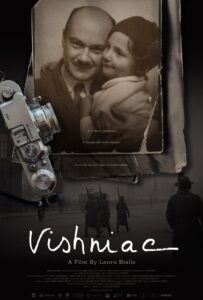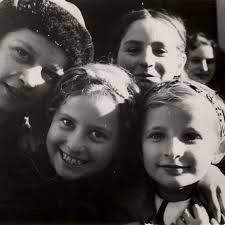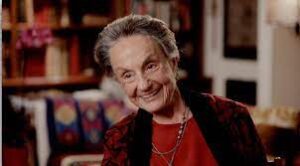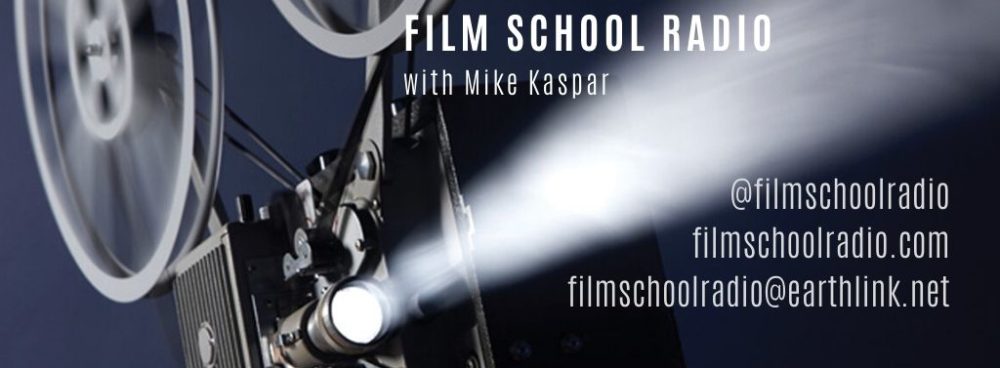Roman Vishniac was difficult and flamboyant, a shameless self-promoter, bender  of the truth and master of reinvention. He
of the truth and master of reinvention. He  was also one of the groundbreaking photographers of the last century – a brilliant artist whose body of work spans decades, continents, and the catastrophic fallout from two world wars. With help from his daughter Mara director Laura Bialis’ brilliant documentary VISHNIAC resets the misconceptions and perceptions of Vishniac into a wholly formed figure in the world of photography, art and science. Though his pioneering microscopy
was also one of the groundbreaking photographers of the last century – a brilliant artist whose body of work spans decades, continents, and the catastrophic fallout from two world wars. With help from his daughter Mara director Laura Bialis’ brilliant documentary VISHNIAC resets the misconceptions and perceptions of Vishniac into a wholly formed figure in the world of photography, art and science. Though his pioneering microscopy  transformed the nature of science photography, Roman Vishniac perhaps is best known now for his iconic images of Jewish life in Eastern Europe from 1935 through 1938. Few predicted that less than a decade later, these communities would be wiped out, and Vishniac’s photographs would provide the last stunning visual records of an entire world. Now for the first time, his story comes to life as a feature documentary. A
transformed the nature of science photography, Roman Vishniac perhaps is best known now for his iconic images of Jewish life in Eastern Europe from 1935 through 1938. Few predicted that less than a decade later, these communities would be wiped out, and Vishniac’s photographs would provide the last stunning visual records of an entire world. Now for the first time, his story comes to life as a feature documentary. A  retrospective and family saga, VISHNIAC is narrated by Vishniac’s daughter Mara. She grew up in his shadow and sought to break free of his grip, only to eventually come around and embrace his legacy. Director Laura Bialis joins us for a conversation on her personal journey to bring Mara Vishniac into the heart of the project, the stories behind the fateful photographs taken Eastern European Jews, Albert Einstein, and the satisfaction of spotlighting one of the more complex figures in the history of modern photography.
retrospective and family saga, VISHNIAC is narrated by Vishniac’s daughter Mara. She grew up in his shadow and sought to break free of his grip, only to eventually come around and embrace his legacy. Director Laura Bialis joins us for a conversation on her personal journey to bring Mara Vishniac into the heart of the project, the stories behind the fateful photographs taken Eastern European Jews, Albert Einstein, and the satisfaction of spotlighting one of the more complex figures in the history of modern photography.
Download MP3 Podcast | Open Player in New Window
For screenings go to: abramorama.com/vishniac
or For more go to: vishniacfilm.com
About the filmmaker – Laura Bialis is an award-winning filmmaker whose projects have taken her from war-torn villages in Kosovo to concentration camps in Poland to underground shelters in Sderot, Israel, less than a mile from the Gaza Strip. Her film Rock in the Red Zone (2015) is a personal view from the ground in Sderot and an exploration of the lives of musicians creating art under rocket fire attacks. The film premiered at the Haifa International Film Festival and screened in more than 80 cities worldwide. In 2007, Bialis released Refusenik, a critically acclaimed documentary chronicling the thirty-year human rights campaign to free more than 1.5 million Soviet Jews. Bialis spent a decade immersing herself in the story of dissidents inside the Soviet Union and their activist allies in the West. She befriended leaders of the movement, including Anatoly (now Natan) Sharansky; filmed key locations including the notorious Perm 36 gulag where Sharansky was held; and conducted more than 100 interviews, with many participants telling their stories on film for the first time. The film was released in 15 cities in the US and broadcast in Israel. Bialis’ film View From the Bridge: Stories From Kosovo (2008) explored tensions among Serbs, Albanian and Roma (Gypsies) in the ethnically divided town of Mitrovica. The film premiered at the Slamdance International Film Festival and was used by the European Union and NATO in training staff working to rebuild Kosovo. Bialis received a BA in history from Stanford University and an MFA in production from the USC School of Cinematic Arts. While at USC, Bialis produced and directed Daybreak Berlin, about German American artist Ilse-Margret Vogel, who was active in Berlin’s underground during World War II. Her next film, Tak For Alt, followed Holocaust survivor turned civil rights activist Judy Meisel through Lithuania as she searched for her father’s grave in an abandoned Jewish cemetery outside the town of Jasvene. The film was honored by the Academy of Motion Picture Arts and Sciences, won the Anti-Defamation League’s Dore Schary Award, was broadcast on PBS, and has been used extensively in American high schools for Holocaust education.
SOCIAL MEDIA
facebook.com/Abramorama
facebook.com/VishniacFilm
twitter.com/VishniacFilm
twitter.com/abramorama
instagram.com/vishniacfilm
instagram.com/laurabialis
“The horror is offscreen yet inescapable…” – Dennis Harvey, 48 Hills
‘Vishniac’ is a perfect marriage of subject and storyteller. Thank goodness Laura Bialis was able to interview Vishniac’s daughter Mara, who passed away in 2018, and accumulate all the background materials that make this film so vividly true” – Leonard Maltin, leonardmaltin.com
“Thanks to this film, books and other museum exhibits in existence, Roman Vishniac’s legacy will live on for years to come.” – Danielle Solzman, Solzy at the Movies
“Bialis reveals his and his family’s lives behind iconic photographs from her access over three years to the complete Vishniac archive of over 23,000 items. She also well illustrates times and places with other apt archival footage and visual context.” – Nora Lee Mandel, Maven’s Nest
“Bialis has done a masterful job bringing Vishniac’s magic and passions to the big screen, which was her sincerest hope.” – Jeanne Kaplan, Kaplan vs. Kaplan
